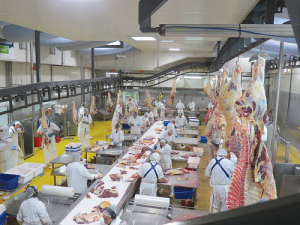Move over ham, here comes lamb
It’s official, lamb will take centre stage on Kiwi Christmas tables this year.
 The red meat sector has been urged not to reinvent the wheel in regards to coming up with organic standards for the industry.
The red meat sector has been urged not to reinvent the wheel in regards to coming up with organic standards for the industry.
Primary sectors need not create new standards for animal welfare, grass-fed, GMO and biodiversity because these are already part of existing organic standards, says Brendan Hoare.
The former chief executive of Organics Aotearoa NZ (OANZ) says a real task, and one that should be done for the best of New Zealand, is to ‘unpack’ the organic standards which have all these components and are internationally recognised.
“New Zealand does not need is a proliferation of standards and confusion in field (farmer) and market (customer). Clearly pathways to best management practices that are aligned with market requirement are essential.”
Hoare moved on from his position as OANZ chief executive at the end of October, after a restructuring of that organisation, but he remains involved in the industry through his company Pure New Zealand.
He says while there are export markets for organic beef, lamb and wool, there is also a very strong domestic market.
“We always say we are not going to solve the red meat sectors’ issues. But we offer solutions for sure and can answer some of the questions they have, but the structural issues they need to organise.”
In its latest market report, Hoare says OANZ made sure they had the Federation of Maori Authorities, DairyNZ, BLNZ and Horticulture NZ and Wine NZ all doing research with them to find out more.
For sheep and beef, results were indicative – although not conclusive – of a trend. At least 50% of BLNZ members, who replied to the research BLNZ put out, wanted to know more about organics. “Farmers want change too. I come from a farming background, I live on a small farm and I am engaged daily,” says Hoare.
“The market wants change and farmers do too. Most farming communities I talk to realise things aren’t great. No one consciously, purposely likes to pollute or destroy the environment. There might be a few, but we have got to offer pathways for people to move. I think that is crucial.
“You can’t [sit] on your high horse and blame; that is not the culture you need. You must have an environment where people have avenues to move at a pace, time and framework which works for them and their families. It has to be sustainable economically over time.”
Bill and Michelle Burgess had an eye-opening realisation when they produced the same with fewer cows.
It was love that first led Leah Prankerd to dairying. Decades later, it's her passion for the industry keeping her there, supporting, and inspiring farmers across the region.
Rangitikei Rivers Catchment Collective (RRCC) chairperson Roger Dalrymple says farmers in his region are taking a national lead in water quality awareness and monitoring.
One young couple is proving farm ownership is still within reach for young Kiwis.
Greenlea Premier Meats managing director Anthony (Tony) Egan says receiving the officer of the New Zealand Order of Merit (ONZM) honour has been humbling.
Waikato dairy farmer Neil Bateup, made a companion of the New Zealand Order of Merit (CNZM) in the New Year 2026 Honours list, says he’s grateful for the award.